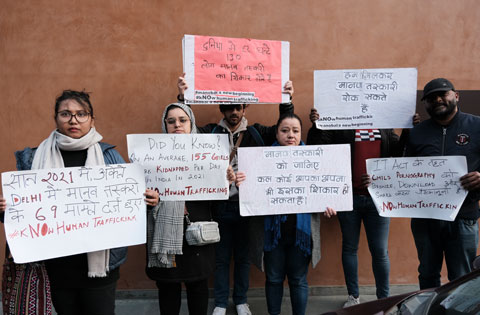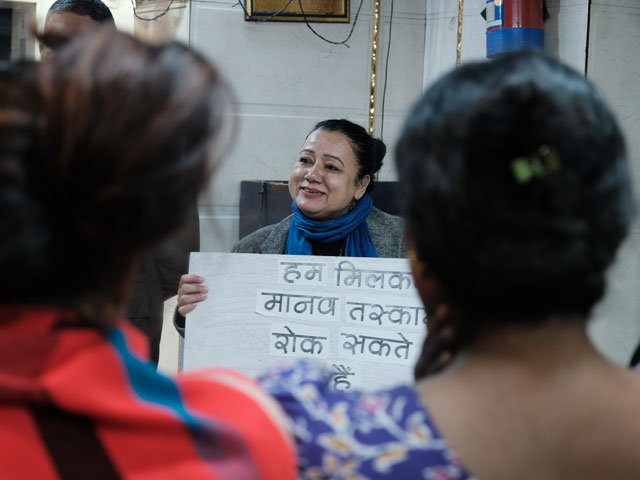Holistic effort needed to combat human trafficking
Combating and preventing human trafficking requires special skills and efforts. Survivors of trafficking require focused care and attention.
Projects

Lighthouse
Often we use the term shelf life to refer to a commodity or food item that is not suitable for consumption or use beyond a time limit. However, have you ever heard of using this term for humans? Probably not, because the life given by God is precious and we respect it.
But, in some corners of our city Delhi, this term is used for human lives. Hundreds of women in India are called out by this term, directly or indirectly. In this scenario, we are talking about around 2,000 sex workers who are forced to live in man-made situations in the red light area of GB Road. In the world of prostitution, the shelf life to work as sex workers is only till 30 to 35 years of age, beyond which they are considered as “old and useless” by their pimps. By the time these women cross 30 years, their health, appearances and spirits are all gone, as per many data.
These women are bought for sex trade at a young age of 13-14 years and sold innumerable times a day to do sex work without having food, water, rest or even during the menstruation. Once the minor girls are trafficked into sex trade, they hardly reunite with their families or go back to the same community. Their life becomes even more impoverished. But they remained important and dear to God as before because every single life is important to him.
After being forced into sex trade, it is very difficult to get out of it. What is even more difficult is to lead a respectable life in society after coming out of it. That’s why our project Lighthouse aims to help such women and children to live a dignified life like everyone in the society.
Abhas
The Abhas Prevention Project targets areas of society at high risk, equipping people with the necessary knowledge to avoid potentially exploitative situations and adopt preventive methods. It also tries to bring awareness among the general public so that they can keep their surrounding area safe.
To stop human trafficking, it is necessary to make common people aware about it. Especially the people of those groups who are close to this risk. No one enters into exploitation willingly, they are ensnared by deceit and false promises. Sometimes poverty is also the reason for this.
Through Abhas Project, we target those areas of society where awareness is most needed and we try to reach out to as many people as possible. We talk to people through social media and in person and make them aware of human trafficking.
Our campaigns spread information to the people who need it most, in their language, telling them:
- How to spot the signs of trafficking
- Where to report it
- Offer to signpost to safety
- To inform about government schemes and plans


These awareness campaigns are delivered in collaboration with partners with a key presence within each community. We have, for example, partnered with local organisation including law enforcement, NGOs, police and media, as well as education institutions and students, which are integrated in the local community.
Impact
Our awareness campaigns are reaching thousands of people and making a positive difference to the environment, making the general public curious, reducing the risk to traffickers and increasing the safety of vulnerable people.
Technology and Human Trafficking

Avoid the Trap!
UNITED NATIONS OFFICE ON DRUGS AND CRIME :
INTERNET SAFETY TIPS TO PROTECT YOURSELF AGAINST HUMAN TRAFFICKING ONLINE
Human traffickers have become adept at using internet platforms, including social media channels, online marketplace sites, and free-standing webpages to recruit victims and attract clients.
Traffickers either actively ‘hunt’ those who they deem as vulnerable to falling victim to trafficking, or passively ‘fish’ for potential victims by posting advertisements and waiting for potential victims to respond.
Below, find some tips to protect yourself and your loved ones against human trafficking:
If your social media accounts are public, then anyone can see your photos, posts, and other information. Traffickers have used this information to reach out to and recruit victims. Consider setting your accounts to ‘private’ and turn off location sharing on posts.
Only accept friend or follow requests from people you know, even if you have friends in common. Traffickers have reached out to strangers to ‘chat’ via social media and then slowly work to build trust with the potential victim.
Remember that everything you put online – photos, texts, etc. – is in the public domain. You no longer have total control over how it is being seen or shared. Traffickers have used people’s photos and personal details to help them blackmail, contact, groom, or otherwise recruit and monitor victims. Never share personal information, such as your phone number, address, or live location online.
Traffickers often use catchy language in job advertisements online, promising high wages for simple work or a chance to become a model. Traffickers will often be vague about the company’s credentials, details, or your terms of employment. If it seems too good to be true, it probably is.
Stay vigilant in the online sphere and report suspicious pages or activities to the authorities.
Don’t hesitate to unfriend, block or report someone who is harassing you or talking to you in a way you don’t like. Click on the links to see how to block accounts on Facebook, Twitter, Instagram, TikTok, and SnapChat.
Take screenshots of the messages or posts – they might be useful later for an investigation or law enforcement.
Being aware of the warning signs of trafficking can help you to identify when you or a loved one is at risk of being ‘groomed’ or recruited online.
Many countries have free, confidential resources and helplines for those who have been or are at risk of being trafficked. Make sure to know your National Human Trafficking Hotline.
Content source: United Nations Office on Drugs and Crime